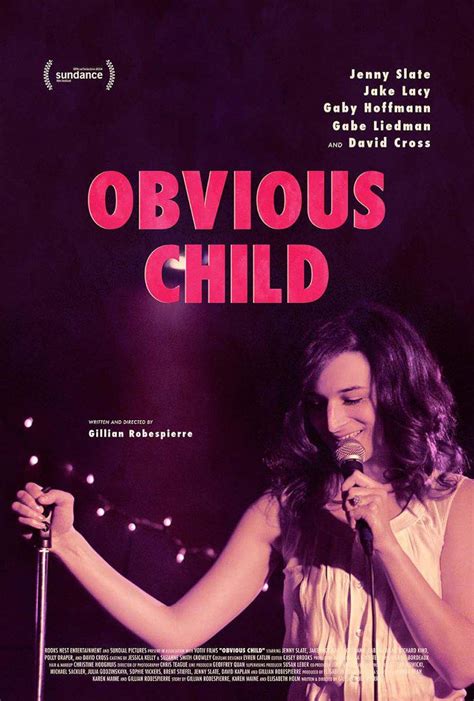Obvious Child
directed by: Gillian Robespierre, year: 2014
actors: Jenny Slate, Jake Lacy, Gaby Hoffmann, David Cross
actors: Jenny Slate, Jake Lacy, Gaby Hoffmann, David Cross

Description:
Obvious Child is a romantic comedy-drama that tells the story of Donna Stern, a sharp-witted stand-up comedian navigating through an unexpected pregnancy after a spontaneous one-night stand. The film explores themes of responsibility, relationships, and personal growth, while maintaining a humorous and heartfelt tone. Donna's journey is both relatable and poignant, offering a candid look at modern womanhood. The film is celebrated for its authentic portrayal of complex issues with a light, comedic touch.Keywords:
Abortion, Comedy, Self Discovery, Relationships, BrooklynWhat is the meaning of the obvious child?
In the movie "Obvious Child," the title refers to the protagonist, Donna, who embodies a candid and unapologetic approach to her life and choices, particularly regarding her unexpected pregnancy. The term "obvious child" symbolizes the innocence and straightforwardness of childhood, contrasting with the complexities of adult life and relationships. Donna's journey reflects themes of self-discovery, the challenges of adulthood, and the often-unspoken realities of women's reproductive choices, highlighting the importance of honesty and authenticity in confronting personal situations.
Is Obvious Child a good movie?
"Obvious Child" is generally regarded as a good movie, praised for its fresh take on romantic comedy and its candid exploration of sensitive topics like abortion. Starring Jenny Slate, the film is both funny and heartfelt, blending humor with serious themes. Critics have highlighted its authentic portrayal of relationships and the complexities of womanhood. With a strong script and relatable characters, it resonates with many viewers, making it a notable entry in the genre. Overall, it's celebrated for its honesty and charm.
Is Obvious Child based on a true story?
"Obvious Child" is not directly based on a true story; it is a fictional narrative. The film, released in 2014, was written and directed by Gillian Robespierre and centers on a young woman named Donna, played by Jenny Slate, who navigates an unplanned pregnancy after a one-night stand. While the characters and events are fictional, the film addresses real-life themes surrounding relationships, reproductive choices, and the complexities of modern womanhood, resonating with many viewers' experiences.
How does Obvious Child end?
"Obvious Child" ends on a hopeful note. After dealing with an unplanned pregnancy and considering an abortion, the protagonist, Donna, embraces her decision with confidence and clarity. Following the procedure, she returns to her life, more self-assured and empowered. The film concludes with Donna performing stand-up comedy, where she shares her experiences with humor and honesty. The final scene highlights her growing relationship with Max, hinting at a potential romantic connection, and reflects her journey toward self-acceptance and independence.
Explore More Categories: